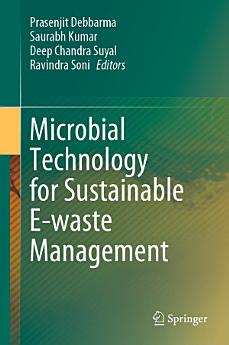Microbial Technology for Sustainable E-waste Management
About this ebook
Nevertheless, the continuous demand for new-generation gadgets and electronics set this high-tech evolution to a new frontier in the last few years. With this continuing trend of technological development, e-waste is expanding exponentially worldwide. In the year of 2019, the worldwide generation of e-waste was approximately 53.6 Mt, of which only about 17.4% of e-waste was collected and recycled, and the other 82.6% was not even documented. E-waste contains various heterogeneous waste complexes such as metals (60%), blends of many polymers (30%) and halogenated compounds, radioactive elements and other pollutants (10%), respectively. The sustainable, efficient, and economic management of e-waste is thus, a challenging task today and in the coming decades. Conventional techniques such as the use of chemicals, incineration and informal ways of e-waste dismantling trigger serious health risks and contamination to the human population and environment, respectively due to the liberation of toxic and hazardous substances from the waste. In this context, bio-candidates especially microorganisms could be sharp-edged biological recycling tools to manage e-waste sustainably. As microbes are omnipresent and diverse in their physiology and functional aspects, they offer a wide range of bioremediation.
About the author
Dr. Prasenjit Debbarma is Assistant Professor at the Department of Botany, Ishwar Chandra Vidyasagar College, Tripura, India. He has 6 years of research and more than 2 years of teaching experience in the field of agricultural microbiology, microbial ecology, environmental microbiology, biotechnology and metagenomics. Dr. Debbarma and his research group developed two (02) novel bacterial consortia viz. C-1 and C-2 for biodegradation of E-waste and significantly, discovered novel bacterial species (Pseudomonas lalkuanensis sp. nov.) and published (NCBI GenBank whole-genome accession no. CP043311). He has published several research papers, reviews, book chapters, popular articles and abstracts in journals of National and International repute. His patent has been recently published in an Indian patent (201811049946).
Dr. Saurabh Kumar is a scientist at ICAR-Research Complex for Eastern Region, Patna, Bihar, India. He has more than 6 years of research experience in his field. His research interests include metagenomics, cold-adapted microorganisms, bacterial membrane vesicles and plant-microbe interactions under arsenic stress. He has published several research articles in reputed international journals.
Dr. Deep Chandra Suyal is Assistant Professor at the Department of Microbiology, Akal College of Basic Sciences, Eternal University, Baru Sahib, Himachal Pradesh, India. He has been actively engaged in teaching and research for more than 10 years and has experience in the fields of agricultural microbiology, molecular biology & biotechnology and metagenomics. He is currently investigating the genomics & proteomics of cold-adapted microorganisms. He has more than 50 publications including books, book chapters and research articles, in respected international journals and publishers.
Dr. Ravindra Soni is Assistant Professor at the Department of Agricultural Microbiology, I.G.K.V., Raipur, India. He has more than 12 years of teaching & research experience in the field of agricultural microbiology, microbial ecology, molecular biology & biotechnology, especially with reference to higher altitudes. He was the recipient of the DST- Young Scientist award from SERB, Department of Science & Technology, India, Dr DS Kothari postdoctoral fellowship from UGC and the Young Scientist Award from the Society for Plant Research. He has more than 100 publications including books, research articles, and book chapters in respected international journals and publishers.






